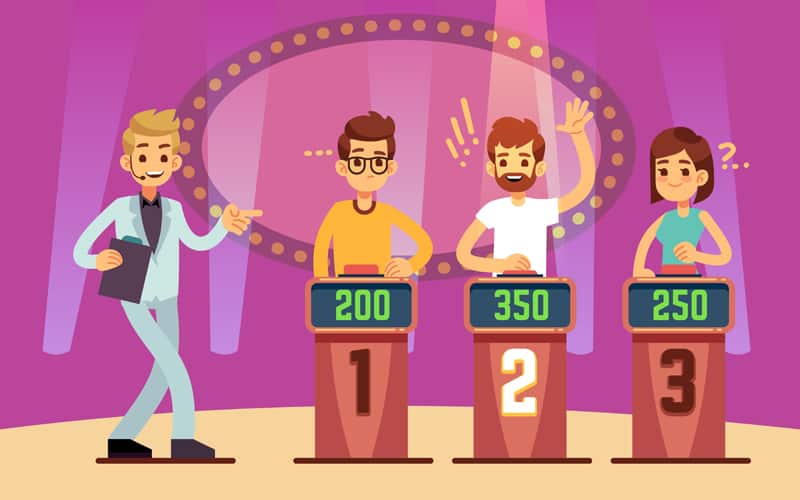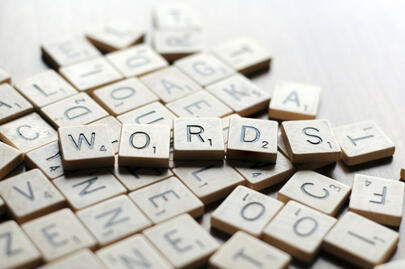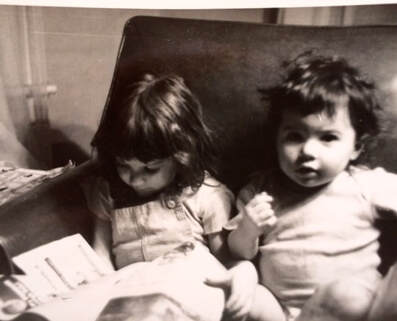all of the selves we Have ever been
 Welcome to America’s hottest new game show: What About the Other Guy?--the audience-participation game in which powerful people are confronted about their behavior. The point of the game is to see who is best at evading responsibility for his actions by shifting attention to someone else. The contestant’s role is to maintain his stance as victim while responding with vague and impressionistic speech that deflects all responsibility for his actions. The contestant then asks: “What about the other guy?” and begins naming names. Prior to the start of the show, audience members record their guesses of who the contestant will attempt to humiliate in this word version of grade school dodge ball. The audience’s answers are compared with the accusations of the contestant, and the correct audience members go home with bragging rights and a moral vacuum. Contestants for the show are selected from a large pool of politicians, CEOs, and powerful wannabes who enjoy the spotlight. When the buzzer sounds at the end of the game, the person who has knocked out and humiliated all of the other guys wins a leadership position in the corporation or branch of government of his choosing where he can raise endless amounts of cash and create maximum pandemonium while building a celebrity brand. The winner is sure to become America’s favorite advisor on everything from space travel to socks, and he receives the additional psychological benefit of unleashing every bit of anger and venom he has nursed throughout his life along with the opportunity to seek pardons for crimes previously committed but not yet publicly revealed. The top ten winners return for the Tournament of Champions, an extreme contest in which the participants compete to see who can bring an end to democracy in the shortest amount of time without breaking a sweat. The winner of that contest earns the title of King, his own social media platform, a television series in which he gets to play God, and a trip to outer space inside a giant penis-shaped rocket. Interested in becoming a contestant? Please answer the following screening questions: 1. Is there anyone smarter than you? 2. Have you ever been wrong? 3. Does a sworn oath mean anything to you? 4. Have you ever been accused of decency? If you answered “yes” to any of the questions, you are not eligible to participate at this time, but keep trying. We love a contestant who never gives up. In the meantime, follow us on our social media platform: What About where we will never share your data. But if it does get out, don't call us; it was probably that other guy.
0 Comments
 This is a week of reckoning, not only in Georgia, or the U.S. House of Representatives, or the Senate, or even the White House. This is a time of reckoning for the American people, a day to ask, “What is happening to us?” All of us. When I was a child, there was a saying, “Sticks and stones may break my bones, but words will never hurt me,” but, of course, some words did hurt. That saying was a child’s feeble response to bullying. We also tried the “I’m rubber, you’re glue; everything bounces off me and sticks to you” defense. It was something a victim might say in the moment, but, again, the words didn’t bounce; they stung. Nothing stuck to the bully, however; his damaged heart was coated in Teflon. Later, when I was a teenager opening my eyes to a wider world and to history, I studied the Holocaust in high school. I watched films and read books. How, I wondered, how could such a thing happen? The horrors were so grave, human behavior so atrocious. I could not grasp how an average citizen could become so monstrous in the treatment of neighbors, friends, and relatives. How could a leader convince an average person, a previously law-abiding person, to abandon his conscience and turn on his countrymen? As an adult social worker and therapist, I had the privilege of meeting European and Russian survivors of the Holocaust. The survivors I met were remarkable people. All of them shared how they once found the rumors of atrocities in their homelands to be unfathomable. All of them had believed that if they kept their heads down and obeyed the rules, did not draw attention to themselves, did what was asked, then right and decency would triumph. Except that it didn’t. Evil prevailed. After years of torment, the survivors were grateful to the Americans who saved them. When World War II ended, Americans settled on a belief that Hitler’s brand of evil was an anomaly, a thing of the past, “it can’t happen here” people said. In the weeks since the United States 2020 presidential election, I have felt paralyzed by the realization that it is happening here, here in the United States of America, the country that once saved the world for democracy. Prior to yesterday’s riots in the Capitol, I fretted over the bloodshed I feared was coming. My friends were more optimistic believing the worst was over. My fears this week have been informed by years of observation and study. There is a growing percentage of the population with a troubling personality type characterized by rigid thinking, an inability to consider opposing points of view, limited capacity for insight, impulsive behavior and poor self-regulation, people with only two settings--adulation or retaliation. As the need for adulation grows, the degree of retaliation escalates. These are people who become intoxicated by demeaning others. They become incapable of empathy. When psychiatrists and mental health professionals studied the imprisoned Nazi guards and elites awaiting trial at Nuremberg, the professionals determined that the guards and Nazi officials were incapable of empathy. That missing ingredient made all manner of horror possible--no shame, no regrets. No amount of facts, no album of photos, no film footage, no eyewitness report could get these prisoners to re-evaluate their actions. Their minds were rigid, their hearts impenetrable. They were made of Teflon and rubber—everything bounced off and stuck to someone else. Today, Twitter has replaced the millions of propaganda-filled leaflets that the Nazi’s once dropped from the sky like snow—the alternative news of that day. Social media has become a place where people can demean and destroy others, turn on their neighbors, and delight in mob rule. People are seduced by gossip and alternative facts on this contagious and intoxicating medium. Without direct eye contact, people lose the capacity to experience the emotional consequences of their words and actions. A light keystroke doesn’t have the same hard impact of throwing a punch to someone’s head, but it can have the same or worse effect. We are all complicit when we view, and share, and like, and tweet, and post these troubling words. It is not just the social media companies that need to police their platforms. Each of us needs to police ourselves. What goes on privately in the windmills of a person’s mind needs to stay there until properly evaluated. We need to consider the people we elevate to stardom and leadership. Social media has made it possible for people to become wealthy and powerful simply by being outrageous, liked, and viewed. At a time when educated, experienced experts are being denigrated, radio shock-jocks, and porn stars are sought for their opinions because they are “influencers” and have followers. We glue ourselves to television shows and celebrities that model degrading behavior in the kitchen, in the boardroom, or in the marriage proposal game. How did this become entertainment? What’s next? Humans being torn apart by hungry lions while we sit in the stands laughing and drinking beer? We are habituating ourselves to images, words, and behaviors that are re-shaping the human psyche and destroying our ability to feel empathy for others. People who complain about demeaning behavior on the team, in the workplace, or in social circles are often told to “let it go,” or “toughen up,” or “there’s nothing you can do.” Our parents once advised us to keep our hands and our words to ourselves. The defense, “she started it” was not acceptable. We were expected to find an exit ramp to the high road or seek appropriate help. Words do hurt. Words can be weapons. That is one of the reasons the pen is mightier than the sword. Words can cut and tear leading to a loss of limbs, a loss of life, bloodshed. Some people can shrug off the hateful words of another. Others seethe with anger and hurt and eventually use all of that negative emotion as rocket fuel on a galactic mission of destruction. We instruct preschoolers to use their words, but there is more to it than that. Choose your words before you use them. Speak truth to power and truth to evil. Avoid the temptation to join in the chatter, to like, to post, to tweet…if doing so demeans your own character or that of someone else. Hold leaders accountable for the character revealed by their words. Even a policy genius is not a worthy candidate if he or she has no conscience. If you would not want their worst behavior directed at you, don’t elect, pick, or hire them to be responsible for others. I hear from people that the situation is hopeless…”Oh, well,” they say. “There’s nothing you can do,” they say. “It’s hopeless,” they say. Hopeless cannot be the last word. The hopeless cannot have the last word. There are other words. Better words. If you are lost for words, start with these: Love your neighbor.  I am in love with a doctor. For years he has entertained me and taught me about kindness and generosity. When I doubted myself, he reassured me, "Oh, the places you'll go!" What I love most about him is that he taught me to read--"One fish, two fish, red fish, blue fish.” But a few months ago, I had occasion to look deeper into my relationship with the good Dr. Seuss. I was having dinner with a colleague and her two beautiful little girls--B One and B Two. As we waited for our food to arrive, mom attended to the infant, B Two. I offered to read to B One, a curious and busy preschooler. I pulled a copy of The Cat in the Hat from my bag. B One advised me that she had several copies of this book at home. While B One drew on her paper place mat, I started into the story. When the Cat in the Hat arrived on the scene, B One said, “He’s mean.” “Mean? Or is he playful?” I asked. “Oh, he’s mean!” B One said with certainty. I was taken aback and needed to quickly revise my own point of view. I have learned not to doubt the profound wisdom and insight of preschoolers. As an adult, I still love the rhymes that fill me with joy, the bright primary colors, all of the action in the story, the suspense. When I am overwhelmed, I still recite to myself “…this mess is so big and so deep and so tall, we cannot pick it up. There is no way at all!” And then I remember that the Cat in the Hat had no fear at all. The mess did get cleaned up—and in the nick of time. B One’s words prompted me to consider the experience of a preschooler who is busy trying to grow a conscience. The Cat in the Hat was not merely playful; he was mean. I stand corrected. Imposing yourself and temptation on the vulnerable is mean. Rules matter… because they do…and for our safety. I began to think about the book as a moral tale--a couple of bored kids at home alone on a rainy day-- definite potential for trouble. Then, of course, trouble arrives with a BUMP, and the Cat in the Hat steps in on the mat. He reminds the children that they can have fun even when it is not sunny. Now that seems like some good cognitive restructuring—at least on the surface. The children don’t know what to do, and there is a stranger in the house! The fish in the dish serves in loco parentis—the voice of the parent IS the voice of conscience at that age. The fish reminds the children they should not get involved with the Cat in the Hat. Then the Cat in the Hat brings some friends to this impromptu party. Things get out of hand and the house is trashed. The boy worries what his mother will say and what she will do to them if she finds them this way. So the boy gathers courage and takes control. He tells the Cat in the Hat “Now do as I say.” The Cat in the Hat gets rid of his friends and returns to help clean up the mess. The story ends with another moral dilemma—“Do we tell our mother the truth about what went on there that day?” Wow! That’s some heavy reading! It is hard work growing a conscience. Some people never do. So lessons learned:
Thanks, B One, for making me wiser! And thanks, Dr. Seuss, for making me a reader! |
AuthorLilli-ann Buffin Archives
July 2024
Categories
All
|

 RSS Feed
RSS Feed